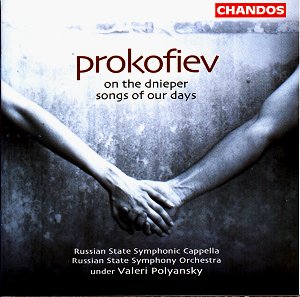The
ballet On the Dnieper was one of the first works in Prokofiev’s
new simpler style. This style emerged after the failure of his
Second Symphony discouraged him from further experiments in musical
complexity. It also succeeded the death of Diaghilev and Prokofiev’s
bitter quarrel with George Balanchine; a falling out that so completely
changed the character of his working relationship with the Ballets
Russes. Parisian audiences didn’t like it. Prokofiev hadn’t yet
got down the difference between writing simply and writing vaporously.
Even as superbly performed as it is here, the music is pretty,
occasionally lovely, even charming, but in general is just forty
minutes of pleasant background. Nothing here could be mistaken
for the slow movement or scherzo of a symphony. The scenario is
passionless Socialist utopianism about rival lovers settling their
differences with reference to the greatest good for the greatest
number. One Parisian critic asked if it were to be taken as a
joke.
Songs
of Our Days is a setting of ‘...contemporary texts published
in Pravda...’ all at least obliquely in praise of Stalin and was
written just after Prokofiev had moved his family to Russia and
severed all ties to Paris. The text was alleged to consist of
Ukrainian and Belorussian folk poetry, and was well received in
Russia; following the performance Prokofiev was given permission
to travel with his wife to the USA — for the last time. Of course,
his sons remained in Russia, so it is not surprising that Prokofiev
refused generous financial offers to remain in the US and returned
home on schedule.
Fortunately
the texts are sung in Russian and are hence incomprehensible to
Anglophones,* although they frequently express authentic folksy
sentiments and are performed here with broad feeling and sense
of fun. Musically this is the Prokofiev of Peter and the Wolf
and Cinderella and the music is engaging and colourful.
The overall effect is that of a rousing folk opera, and is a nice
antidote to the somnolent mood established by the ballet. Baritone
Igor Tarasov deserves a special medal for his clear rapid-fire
delivery; if G&S is done in Russia, he would be the choice
for the patter songs. Mezzo Smolnikova sings the Lullaby
with great lyrical affect. ‘Bayushki-bayu’ (‘sleep little
one, sleep’) is left untranslated in the printed English text.
*unless
you want Russian texts to help you study the language; they are
very good for this use as they are clearly enunciated and conversationally
phrased. The Russian texts are printed in Cyrillic.
Paul
Shoemaker
